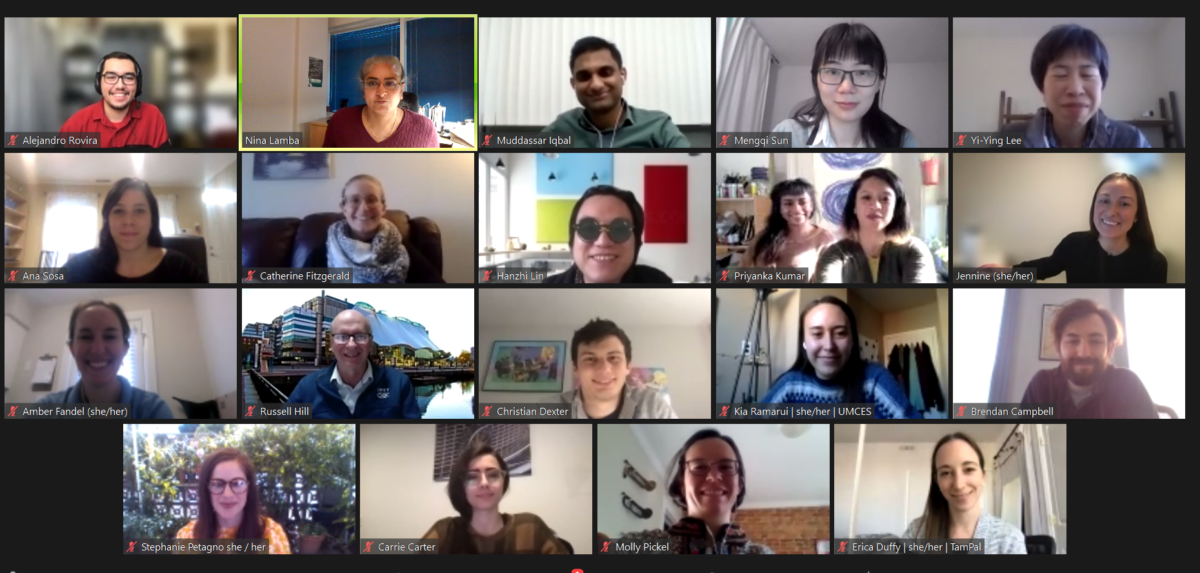A tampon and pad vending business won the top prize at the MICA UP/Start Venture Competition, the entrepreneurship challenge that brings together creative businesses in the community of the Maryland Institute College of Art (MICA).
TamPal, founded by MICA Design Leadership MBA/MA candidate Erica Duffy, is seeking to innovate on the coin-operated tampon and pad dispensers often found in public restrooms. Along with providing holders, the product will contain systems to track and reorder supplies, Duffy has said. The product and Duffy’s pitch earned $35,000.
In all, eight ventures were finalists in this year’s competition, and more than $105,000 was awarded at the finale event on April 14. Others receiving funding included:
- Reside Burials, a company providing eco-friendly burial solutions to residents of the Chesapeake Bay Watershed founded by undergraduate Carrie Carter, received $25,000.
- Garden Party Press received $15,000 and won the $5,000 people’s choice award. It offers group portraits in which each person is represented by the flower of their birthday month, and was founded by illustration master’s student Chelsea Conrad.
- Anchovy Press, founded by Rebecca Marimutu and Priyanka Kumar won $14,100. The independent publishing company creates picture books for children centered on Black and brown experiences.
- Dexter Design Co., founded by Christian Dexter, manufactures moveable type through CNC milling. The company received $8,900.
- Confetti Collection Co., founded by Charlene Etienne, aims to offer an “event planner in a box” with curated party décor and goods. It received $2,000.
- Paper costume company Foraday, created by Sean Duffy and Stephanie Petagno, and gender neutral skincare and lifestyle brand Le Boi, created by Yuze Le, each received a $500 stipend.
The UP/Start finale is the culmination of a two-month process, which started with a virtual version of a “pop up and pitch” event that allows MICA students and recent graduates to present their companies. When finalists are chosen, prep for the finale involves connections to the wider Baltimore entrepreneurial community, as well.
This year, the development work ahead of the finale included a “pitch and mix” event, with scientist-entrepreneurs in the Ratcliffe Environmental Entrepreneur Fellowship (REEF) at Inner Harbor’s Institute of Marine and Environmental Technology (IMET). The March 19 event allowed the creative and scientist entrepreneurs to pitch each other, and get feedback from different perspectives.
Though they had differing backgrounds, the ideas had common ground. Both cohorts had cosmetics lines, for instance. IMET students were working on formulas for reef-safe sunscreen and plastic-free glitter, while Le Boi represented MICA.
Bringing together two cohorts supported by the Philip E. and Carole R. Ratcliffe Foundation, the event is becoming an annual feature of both programs.
“Students gain so much from practicing their pitch in a friendly environment with peers who are also early in their entrepreneurship journeys,” said Nina Lamba, associate director of IMET, in a statement. “That students with very diverse backgrounds can successfully pitch a variety of business ideas to each other, speaks to the caliber of the students and the work they have put in.”

The MICA x IMET “Pitch and Mix” event. (Screenshot courtesy of MICA)
The REEF students, which were taking part in the seventh year of the program, also have a pitch competition in the spring. This follows work on business plans, market assessment, patents and funding.
MICA’s UP/Start is in its sixth year, and is part of growing entrepreneurship programming. It’s now operating within the arts college’s The Ratcliffe Center for Creative Entrepreneurship, which was created in 2020 following a $5 million gift from the Ratcliffe Foundation. Along with the established venture competition, the Center is introducing a minor in creative entrepreneurship for undergraduate students. Along with with MICA’s career development activities, there’s an aim to help the creative professionals that the college educates gain the tools to build a business around their talents.
“We definitely believe that entrepreneurship and creative practice are intertwined for art and design students,” said Jennine Stankiewicz, director of career development and co-director of creative entrepreneurship at MICA. “Being an artist, in some ways you really have to be entrepreneurial. … The Ratcliffe Center for Creative Entrepreneurship is really to help them build those skills.”
It’s all about reinforcing a key idea: “It’s OK to make money off of your work and build a sustainable life for yourself,” Stankiewicz said.
Before you go...
Please consider supporting Technical.ly to keep our independent journalism strong. Unlike most business-focused media outlets, we don’t have a paywall. Instead, we count on your personal and organizational support.
3 ways to support our work:- Contribute to the Journalism Fund. Charitable giving ensures our information remains free and accessible for residents to discover workforce programs and entrepreneurship pathways. This includes philanthropic grants and individual tax-deductible donations from readers like you.
- Use our Preferred Partners. Our directory of vetted providers offers high-quality recommendations for services our readers need, and each referral supports our journalism.
- Use our services. If you need entrepreneurs and tech leaders to buy your services, are seeking technologists to hire or want more professionals to know about your ecosystem, Technical.ly has the biggest and most engaged audience in the mid-Atlantic. We help companies tell their stories and answer big questions to meet and serve our community.
Join our growing Slack community
Join 5,000 tech professionals and entrepreneurs in our community Slack today!

The person charged in the UnitedHealthcare CEO shooting had a ton of tech connections

From rejection to innovation: How I built a tool to beat AI hiring algorithms at their own game

Where are the country’s most vibrant tech and startup communities?



